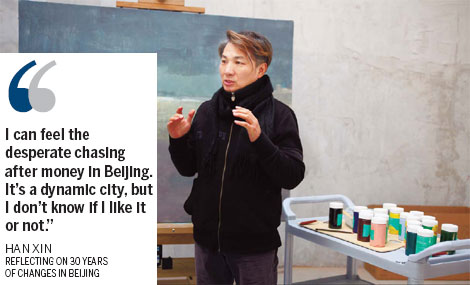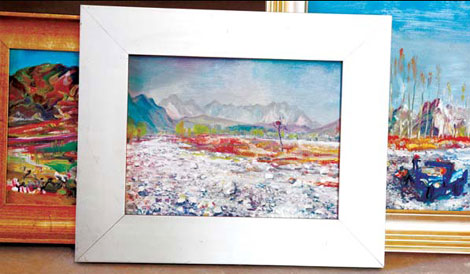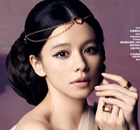Profile
Bidding a fond farewell to the past
By Wang Chao (China Daily)
Updated: 2010-03-15 10:20
 |
Large Medium Small |
The paintings of Han Xin capture modern life as it intrudes on tradition
|
 Han Xin talks in front of his painting, China Mobile and the Summer Palace.
Wang Jing / China Daily |
Han Xin's studio is full of paintings of Beijing. His huge painting, China Mobile and the Summer Palace, for example, features the tall signal tower erected by China Mobile standing behind the 17 Arch Bridge, symbol of the Summer Palace.
"This is how I feel about Beijing after 30 years living in the US -modern civilization intruding on tradition."
Han's studio is located in the painter village in Songzhuang, Tongzhou district in Beijing. The 500 sq m studio is surrounded by trees where pheasants and rabbits come and go. Han said this house reminds him of his home back in Columbus, Ohio. "It is hard to find such a spacious place in Beijing nowadays. I am really lucky to have such a space."
Han, 55, was born in shanghai but came to Beijing to study at the Central Academy of Fine Arts in the late 1970s.
More than 30 years ago, Han was the youngest artist to be blacklisted along with Feng Zikai and Liu Haisu, pioneers of China's contemporary art scene. Nowadays Han still views it as a great honor since he got the chance to sit right beside the two masters.
"Everybody else at my age was painting Mao Zedong's quotations at that time; while I painted skulls and pink sky and named them resilience." Han said.
When Han moved to the US in the 1980s, he spent one year in the New York subway producing a series of paintings that although having a gloomy and cold, even chilling, aura, convey his excitement.
"To a young man who had just left a relatively undeveloped country and rushed into a modern city, the subway and the people there were so exotic."
One of the paintings, It is a Beatable Feeling, was bought by a friend and hung in his office. "The clients complained that it was too powerful, that it distracted them too much. My friend had to move it away." Han said, laughing.
The series gained him a special prize: to live one year in Claude Monet's house in Giverny, France, to paint. "Only nine artists were invited," Han said proudly.
In the US, Han became a commercial painter in Columbus, Ohio. He proudly claims to be the "only one" that could make a living by painting in that city. He never denies his commercial streak, that he painted everything that would make money, from Mao to the Forbidden City to the New York subway.
His first painting Free Agent, which is about a woman eating an icecream in the New York Subway, earned him $15,000 in 1987, which was a huge amount at that time. In the year 1997 when Hong Kong returned to China, he painted casual portraits of Chairman Mao and Deng Xiaoping that sold very well in Hong Kong.
After Chen returned to Beijing last January, he was shocked by the huge changes, which he sees as mainly negative.
"I used to ride a bike to visit the Forbidden City every week. I remember it was so quiet and empty when riding through the Donghuamen street in the rain," Han recalled with a sigh. "Now this street is turned into a snack street selling toasted scorpions and sheep penises. Long gone are the good old days."
|
 Han Xin focuses on the contrast between the old and new Beijing through the painting of the dried Yongding River. Wang Jing / China Daily
|
Han said this series is a reflection of Beijing's transformation over 30 years. "I can feel the desperate chasing after money in Beijing. It's a dynamic city, but I don't know if I like it or not."
Besides his studio in Songzhuang, Han also paints in Chen Danqing's studio in Chaoyang district. "We review the good old days, especially after our best friend Chen Yifei passed away in 2005". Chen Yifei was a famous director and painter based in Shanghai.
Han joked that his return was triggered by the success of his old friend Chen Danqing after Chen returned to Beijing from the US in 2000.
Chen Danqing, a famous writer and painter in China, is Han's best friend, "Han claims he will paint until he is 90," Chen wrote for Han's book Pass the Past Away.
A father of three sons now; Han said he dyed his hair gold when he was 50. "I don't know if he will still have any hair to dye when he is 90!" Chen said poking fun at Han.
"I read Chen's books and I love them," Han said. "He is only two years older than me, and we began to play and fight with each since we were teenagers. But you know what? I have more life experiences than Chen, I can write my book too!"
Han hasn't yet included writing as part of his daily schedule; but he said when does it will be semi-autobiography.
In the new year, Han plans to paint a new series on the impact of China's rapid development, "I want to embed my social statement into it."







